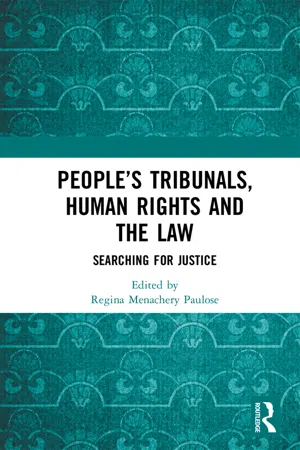
People’s Tribunals, Human Rights and the Law
Searching for Justice
- 202 pages
- English
- ePUB (mobile friendly)
- Available on iOS & Android
About this book
People's Tribunals are independent, peaceful, grassroots movements, created by members of civil society, to address impunity that is associated with ongoing or past atrocities. As such, they offer society an alternative history and create a space for healing and reconciliation to take place that may otherwise be stifled by political agendas and legal technicalities. Since the 1960's, People's Tribunals have grown and developed to address many kinds of situations, from genocide to environmental degradation.
This book presents a balance of academic and practitioner perspectives on People's Tribunals. It explores key questions relating to their formation and roles and discusses what they can offer to victims and survivors. The volume provides an introduction to the subject, theoretically informed discussion reflecting different perspectives, and a range of contributions focusing on different types of People's Tribunals and various aspects of their operation. The authors analyse advantages and disadvantages of these movements in a variety of contexts. The impact and contribution they have in the international criminal law and international human rights context is also discussed.
The book will be welcomed by those interested in international criminal law, human rights, environmental justice, transitional justice and international relations.
Frequently asked questions
- Essential is ideal for learners and professionals who enjoy exploring a wide range of subjects. Access the Essential Library with 800,000+ trusted titles and best-sellers across business, personal growth, and the humanities. Includes unlimited reading time and Standard Read Aloud voice.
- Complete: Perfect for advanced learners and researchers needing full, unrestricted access. Unlock 1.4M+ books across hundreds of subjects, including academic and specialized titles. The Complete Plan also includes advanced features like Premium Read Aloud and Research Assistant.
Please note we cannot support devices running on iOS 13 and Android 7 or earlier. Learn more about using the app.
Information
1 Can you hear the people sing? Victim/survivor rights in People’s Tribunals
Contours and history
People’s Tribunals defined
History and types of People’s Tribunals
Table of contents
- Cover
- Half Title
- Title
- Copyright
- Contents
- Author biographies
- Introduction
- 1 Can you hear the people sing? Victim/survivor rights in People’s Tribunals
- 2 Political will and the people’s will: the role of People’s Tribunals in international justice
- 3 People’s Tribunals and truth commissions
- 4 Panem et circences? People’s Tribunals from a TWAIL perspective
- 5 The right to tell: the Sarajevo Women Court in search for a feminist approach to justice
- 6 The Iran Tribunal: an international People’s Tribunal for the promotion of truth and justice
- 7 The role of the PPT in securing the rights of Rohingya and other minorities in Myanmar
- 8 People’s Tribunals, law and ecological justice: the Australian contribution
- 9 People’s Tribunals and how they examine childhood sexual abuse
- 10 The China Tribunal
- 11 Transitional justice delayed is not transitional justice denied: contemporary confrontation of Japanese human experimentation during World War II through a People’s Tribunal
- 12 From painkillers to cures: challenges and future of People’s Tribunals
- Index